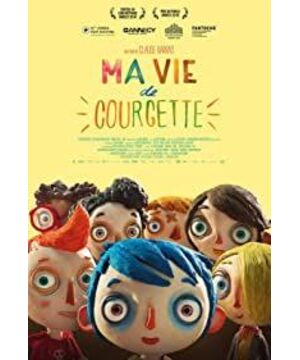The movie "Life of Zucchini" should be considered a relatively small minority. It is not as vigorous as "Zootopia" and is known to all ages. It's not too funny, and focuses more on real life from a child's perspective. If you are not a fan of anime movies, you may miss this work directed by Claude Ballas and jointly produced by a Swiss and French team after 18 months. Although little known in the mainland, the film was widely acclaimed in Europe, winning two Lumiere Awards, one European Film Award, and one Global Award nomination.
It is worth mentioning that the film is a stop-motion animation. The scenes, objects and characters of the film are all made of clay, giving people a new and weird feeling. In the film, Zucchini's father cheated, and Zucchini lived alone with his mother, but his mother never recovered from the emotional injury, and was depressed all day, except for watching TV and drinking. On a rainy day, the zucchini made her mother angry because she was afraid of scolding, and she fell down the stairs to her death. Zucchini is sent to an orphanage by a well-meaning police officer. Because he came last, he was rejected and laughed at by other children in the orphanage, but the world of children is not that complicated, and they opened their hearts through quarrels and fights. Zucchini has always been shrouded in the shadow of killing his mother, but through communication, he learned that other children had the same terrible experience as him, some of them were abandoned by their parents, some were threatened by bad guys, some because their parents used drugs or went to jail ...
Zucchini slowly opened up and mingled with the children of the orphanage. One day, a new girl came to the orphanage named Camille. Camille lost her family because her father killed her mother and was forced to go to the orphanage with her aunt. She didn't want to tell her friends what happened to her, Zucchini understood why she was like this. The two children depended on each other, became each other's best playmates, and gradually developed a trace of affection.
Children in the orphanage help each other, play together, travel with their teachers, slowly walk out of the shadows and become cheerful. Like all stories, in order to have a good outcome, you must go through all the trials - Camille's aunt, when she learned that the Camille family had a lot of wealth, even threatened the headmaster of the orphanage to take Camille away. But the children all know that Camille's aunt is just to inherit property, she even beat Camille behind his back, Camille hates her very much. Fortunately, the orphanage children came up with a good idea and recorded evidence of Camille's aunt beating and scolding Camille. In the end, the well-meaning police took in Zucchini and Camille. When Zucchini says goodbye to Camille and the rest of the orphanage, the film reaches another tear-jerking juncture.
Yes, the story is cliché and simple, but it won the prize because it was warm and hit the emotional underbelly of the viewer's body. In the film, when the orphanage teacher is pregnant, she talks about how she will use her life to cherish the soon-to-be-born child. Even if he is ugly? Even if he smells bad? Even if he cries? Even if he wets
the bed? Even if he has bad grades? Even if he is stupid? Even if he eats like a pig? He forgot his name? And smelly feet? Even if he was unbearable and kept yelling? Even if he farted? Even if he scribbled on the walls? Even if he wanted to be a cop? Even if he had A giraffe's neck? Even if he is trash? Do you still love him?" This series of questions is exactly the orientation of the children in the orphanage. They feel that they are unhappy and abandoned, and have not really received the love of their parents, so They both fear and yearn for this love.
When Zucchini informs his best friend that he and Camille will be adopted by the kind police, his good friend expresses his sadness, but then asks Zucchini to leave the orphanage to experience true love... Orphanages are not the place for children.
At this point in the film, the author's intention is very clear. He wants to tell a warm story about how to find light in the dark.
The children of the orphanage are afraid of love, but more eager for it.
Once love really comes, they will encourage children like themselves to bravely accept love...
No one can control what kind of unfortunate family they are brought into,
But we have the right to choose to love others,
have the right to receive the care of others, and have the
right to receive real, brand-new love from parents, friends, and lovers...
View more about My Life as a Zucchini reviews










